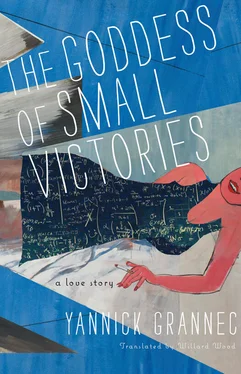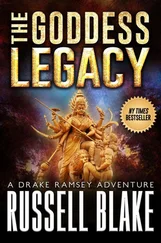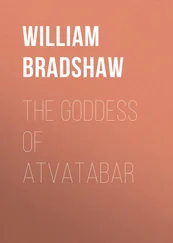“Adele, I found this in a separate place, in a closed file folder.”
I examined the slender page: a series of signs, axioms and definitions, without explanation or commentary, as flat as a day without music. My gaze stumbled across the last sentence, fully spelled out: “Theorem 4: there is necessarily something that is like God.” What was God doing here? I reread the proof, since it seemed to be one. I couldn’t make heads or tails of the jargon. His damned logic again, which I had never learned to speak. Positive property; if and only if; consistent property .
“Is it important?”
“It must be a proof that shows … the existence of God.” 63
Elizabeth read the page with and without glasses. She gave the paper back to me, perplexed, undoubtedly disappointed.
“We’ll put it under ‘Miscellaneous.’ ”
What lack of humility! What madness! How could he? What chasm had he come to? God must have been pleased to have him at His table! Kurt could make conversation with Him: “Hey, Pater! I’ve got a good one. You’re going to love this! I’ve proved Your existence.” Did God have a sense of humor? I was sure of it. Otherwise, we would never have met, Kurt and I.
I had to admit the fact that I was relieved. My string of blasphemies confirmed it. It was time for him to go. Our final years had ended in hell. How could I have stood to see him like that much longer? An unbearable caricature of himself, who went from being thin to skeletal, from being a genius to mad. Had it happened all at once, or had he strayed and gotten lost in the infinite border between those two essences? Lost forever in the continuum.
For all those years, I had managed to maintain hope. I had believed in possibilities. But when Oskar found him crouching behind the boiler, I gave up. I went into mourning for those possibilities. For the me that would never exist, for the him that he could have been, for what I would never be again without him. If and only if we had been others . I preferred keeping him in my memory: he wipes his glasses to get a better look at my cleavage in that tearoom in Vienna.
I’ve always eaten my black bread last: I had set aside two boxes marked “Personal.” Elizabeth and I each took one. There was no likelihood of my finding love letters inside. We had left them to burn in Vienna. I might find a few of my postcards from Europe or some of the photographs that hadn’t turned up earlier. But most likely they held letters from his liebe Mama . After all these years, why did it make me so upset? She had often been the focus of my anger. Presumably the old girl wasn’t to be outdone. Old girl. I was one of them now. Why worry about a dead woman’s opinion? The truth I’d always avoided was plain enough: I was her double, just a crutch.
“What should I do with this?”
Elizabeth was holding a pile of his constipation and body-temperature notebooks. She kept her tone light; she had cared for my husband without commenting on his quirks.
“I’d be happy to throw them in the fire, but someone would surely reproach me for it! These odd records were also a part of him.”
“I’m just thinking of the reaction of the person who finds them.”
“It will be a relief from all the rest.”
“You’re not afraid that he’ll be taken for—”
“Look at this, he kept the bill for our wedding lunch! I can’t believe he crossed all of Siberia with this paper in our trunks.”
“Maybe he was nostalgic.”
“He intended to present the total bill to me at the end.”
“He loved you so much, Adele.”
“Now that’s a good one. A bill requesting his membership dues for the Mathematical Society. Kurt hated debts. He would have been unhappy about this all his life. I should send them a check.”
“Save your money, Adele. You’re going to need it. I just found a receipt for something called Principia Mathematica .”
“It was his constant reading when we first met. Put it with his doctoral thesis in the box marked 1928/1929.”
I looked through some worn postcards. Maine, 1942. We’d bought them together and never sent them.
“Your German passports, which box do they go in?”
I opened his. He looked so young, he seemed a completely different person. The Nazi eagle had released its turd on the page. I gave both passports back to Elizabeth without even opening mine.
“The box for 1948, with the naturalization papers.”
“Good grief, Adele, how pretty you were! I’ve never seen this photograph before.”
I glanced for a moment at the yellowing print of a young lady posing, a vague smile on her lips.
“File it with ‘Miscellaneous.’ ”
“Don’t you want to keep it for yourself?”
“I’m not that person anymore, Elizabeth.”
“Of course you are!”
I continued sorting through the documents. I came across a letter from his brother addressed to the sanatorium: the 1936 box. An ocean liner ticket from Japan: the 1940 box. A heavy file with financial records for the mortgage on the house: the 1949 box. It had been paid in full and now had been resold. I was moved by a tiny piece of faded paper, a coat-check claim from the Nachtfalter: the 1928 box.
“There are still these letters from Marianne Gödel.”
I sighed. “I’ll have to read the whole thing.”
“You’re not obliged. It’s painful for you.”
“Would you leave me alone with them? It won’t take me long.”
“I’m going to finish packing your boxes. You really don’t want to take anything with you?”
“Send everything to the storage facility. You’ve seen the bedroom at Pine Run. There’s no room for bulky memories. Which is a good thing!”
“Should I call the IAS about the archives?”
“Not right away, Elizabeth.”
What had they found to write about over the course of all those years? She probably heaped a boatload of blame on me. He would barely have defended me, as usual. I’d never been able to inspire him, to stimulate his intellect. It wasn’t my role, and I didn’t feel any resentment about it. But had he granted her all the explanations he’d refused me? Had she had access to his light? That woman.
I opened one at random: 1951, congratulations for his prize. A letter dated November 1938, a month after our wedding, went on endlessly about political issues and sanitary advice. 1946: the situation in Europe, news of his godfather’s death. In 1961, she responded to his theological view of the world. 64He had explained it to her in detail, then. I feverishly unfolded one after another of her letters, absorbed in their revelations. Elizabeth stuck her head in the door from time to time but, unwilling to intrude, went back to her chores.
I found no trace of bitterness toward me. In forty years of correspondence, she never wrote about me once or even mentioned my name. The letters burned my fingers.
“Have you finished, Adele?”
I turned my ravaged face toward Elizabeth. My first tears since Kurt’s death. She took me in her arms, rocked me without saying any useless words. I clung to her, drunk with a mixture of rage and pain. I was reeling with despair. My temples pounded to the beat of my frightened heart. But I didn’t want to leave. Not right away.
“I didn’t exist for them, Elizabeth. I never existed.”
When I calmed down, I extricated myself from her embrace. I painstakingly gathered the letters that had spilled on the floor and threw them in the fire.
Anna shook the snow off her clothes and her hair before entering the lobby of the IAS. She hadn’t expected this late cold spell; she was shivering in her lightweight beige coat. Nature would mourn in white today. She needed to think about putting away her cold-weather clothes. Since Adele’s funeral she hadn’t set foot in the office or given any reason for her absence. She hadn’t answered the telephone, hadn’t opened her mail. Her sudden reappearance would demand an explanation. As Adele might have said, “You can all go to hell!”
Читать дальше












